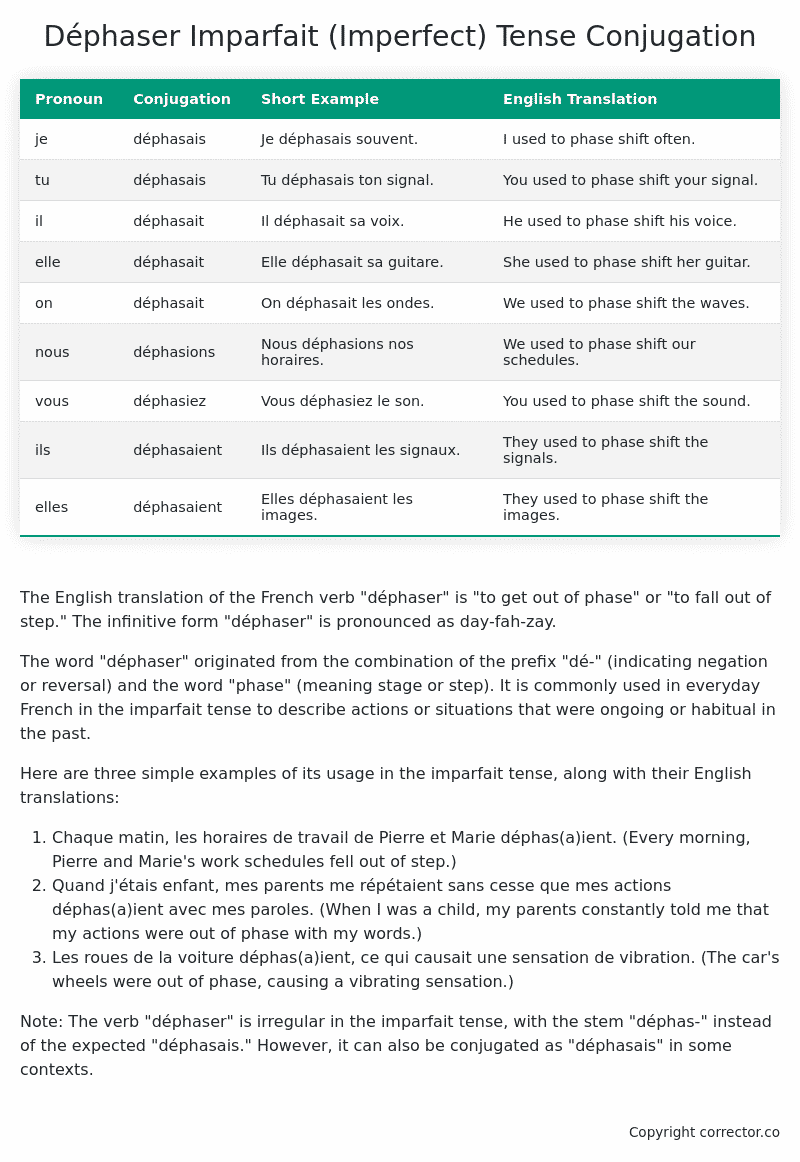Imparfait (Imperfect) Tense Conjugation of the French Verb déphaser
Introduction to the verb déphaser
The English translation of the French verb “déphaser” is “to get out of phase” or “to fall out of step.” The infinitive form “déphaser” is pronounced as day-fah-zay.
The word “déphaser” originated from the combination of the prefix “dé-” (indicating negation or reversal) and the word “phase” (meaning stage or step). It is commonly used in everyday French in the imparfait tense to describe actions or situations that were ongoing or habitual in the past.
Here are three simple examples of its usage in the imparfait tense, along with their English translations:
- Chaque matin, les horaires de travail de Pierre et Marie déphas(a)ient. (Every morning, Pierre and Marie’s work schedules fell out of step.)
- Quand j’étais enfant, mes parents me répétaient sans cesse que mes actions déphas(a)ient avec mes paroles. (When I was a child, my parents constantly told me that my actions were out of phase with my words.)
- Les roues de la voiture déphas(a)ient, ce qui causait une sensation de vibration. (The car’s wheels were out of phase, causing a vibrating sensation.)
Note: The verb “déphaser” is irregular in the imparfait tense, with the stem “déphas-” instead of the expected “déphasais.” However, it can also be conjugated as “déphasais” in some contexts.
Table of the Imparfait (Imperfect) Tense Conjugation of déphaser
| Pronoun | Conjugation | Short Example | English Translation |
|---|---|---|---|
| je | déphasais | Je déphasais souvent. | I used to phase shift often. |
| tu | déphasais | Tu déphasais ton signal. | You used to phase shift your signal. |
| il | déphasait | Il déphasait sa voix. | He used to phase shift his voice. |
| elle | déphasait | Elle déphasait sa guitare. | She used to phase shift her guitar. |
| on | déphasait | On déphasait les ondes. | We used to phase shift the waves. |
| nous | déphasions | Nous déphasions nos horaires. | We used to phase shift our schedules. |
| vous | déphasiez | Vous déphasiez le son. | You used to phase shift the sound. |
| ils | déphasaient | Ils déphasaient les signaux. | They used to phase shift the signals. |
| elles | déphasaient | Elles déphasaient les images. | They used to phase shift the images. |
Other Conjugations for Déphaser.
Le Present (Present Tense) Conjugation of the French Verb déphaser
Imparfait (Imperfect) Tense Conjugation of the French Verb déphaser (You’re reading it right now!)
Passé Simple (Simple Past) Tense Conjugation of the French Verb déphaser
Passé Composé (Present Perfect) Tense Conjugation of the French Verb déphaser
Futur Simple (Simple Future) Tense Conjugation of the French Verb déphaser
Futur Proche (Near Future) Tense Conjugation of the French Verb déphaser
Plus-que-parfait (Pluperfect) Tense Conjugation of the French Verb déphaser
Passé Antérieur (Past Anterior) Tense Conjugation of the French Verb déphaser
Futur Antérieur (Future Anterior) Tense Conjugation of the French Verb déphaser
Subjonctif Présent (Subjunctive Present) Tense Conjugation of the French Verb déphaser
Subjonctif Passé (Subjunctive Past) Tense Conjugation of the French Verb déphaser
Subjonctif Imparfait (Subjunctive Imperfect) Tense Conjugation of the French Verb déphaser
Subjonctif Plus-que-parfait (Subjunctive Pluperfect) Tense Conjugation of the French Verb déphaser
Conditionnel Présent (Conditional Present) Tense Conjugation of the French Verb déphaser
Conditionnel Passé (Conditional Past) Tense Conjugation of the French Verb déphaser
Conditionnel Passé II (Conditional Past II) Tense Conjugation of the French Verb déphaser
L’impératif Présent (Imperative Present) Tense Conjugation of the French Verb déphaser
L’impératif Passé (Imperative Past) Tense Conjugation of the French Verb déphaser
L’infinitif Présent (Infinitive Present) Tense Conjugation of the French Verb déphaser
L’infinitif Passé (Infinitive Past) Tense Conjugation of the French Verb déphaser
Le Participe Présent (Present Participle) Tense Conjugation of the French Verb déphaser
Le Participe Passé (Past Participle) Tense Conjugation of the French Verb déphaser
Struggling with French verbs or the language in general? Why not use our free French Grammar Checker – no registration required!
Get a FREE Download Study Sheet of this Conjugation 🔥
Simply right click the image below, click “save image” and get your free reference for the déphaser imparfait tense conjugation!

Déphaser – About the French Imparfait Tense
NOTE: To take a deep dive into all the French tenses then see our article on Mastering French Tense Conjugation.
Formation of the Imparfait Tense
For regular -er verbs:
For regular -ir verbs
For regular -re verbs
Common Everyday Usage Patterns
Description of Past Habits
Background Information
Mental and Emotional States
It’s employed to express emotions, thoughts, or physical sensations in the past. For example: “J’étais content quand il est arrivé.” (I was happy when he arrived.)
Ongoing Actions
Points to Note About the Imparfait Tense
Passé Composé vs. Imparfait
Conditional
Si Clauses
Narration
I hope you enjoyed this article on the verb déphaser. Still in a learning mood? Check out another TOTALLY random French verb imparfait conjugation!


